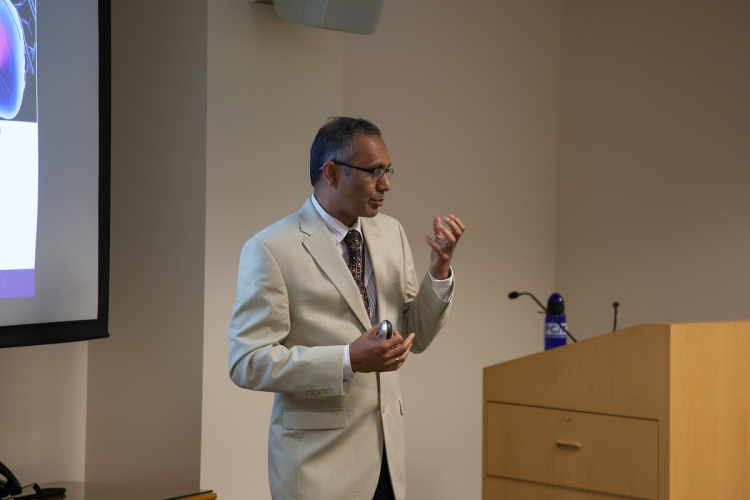Some of the foundational science courses, like pharmacology, pharmaceutics and biochemistry, can be challenging for students. Helping them to connect what they’re learning to its practical application in patient care is what Rajesh Vadlapatla, PhD, interim chair of pharmaceutical sciences and an associate professor in Marshall B. Ketchum’s planned College of Pharmacy, does best.
“When I talk to them about the research,” Vadlapatla says of students, “they see how important it is to have a thorough understanding of foundational sciences in order to launch oneself into a pharmacy practice.”
Dr. Vadlapatla began his education in India with a bachelor’s degree in pharmacy from Bangalore University, after which he worked in the pharmaceutical industry for several years before coming to the United States to earn a master’s degree from the University of Toledo. His appetite for research in pharmaceutical sciences led him to pursue a PhD from the Department of Pharmaceutical Sciences at the University of Arkansas.
Since 2015, Dr. Vadlapatla has helped develop and nurture the new pharmacy program at Ketchum, much as he did at the University of Saint Joseph in West Hartford, Connecticut. For the first year or so, his efforts focused on hiring and mentoring pharmaceutical sciences faculty, developing curriculum and securing accreditation for the program.
As the pharmacy program becomes established, he hopes to turn more of his attention to research.
“For the first one, one-and-a-half years,” he says, “I'll need to prioritize my time to establish didactic curriculum in the foundational sciences, at the same time trying to seek avenues to launch my research." He believes as the program becomes more established he will be able to dedicate more time for his research endeavors.
Dr. Vadlapatla's research in drug delivery systems has become well known. His presentations at meetings of the American Association of Colleges of Pharmacy led to his election as secretary of the pharmaceutics section of that body in 2011. He serves as a peer reviewer of AACP’s journal, as well as the American Journal of Pharmaceutical Education, Journal of Pharmaceutics and Drug Delivery Research and Journal of Pharmaceutical Sciences and Pharmacology.
His latest research article, “Stability of High Dose Insulin in Normal Saline Bags for Treatment of Calcium Channel Blocker and Beta Blocker Overdose,” is submitted for review in Clinical Toxicology, a peer-reviewed journal. The article provides vital clues about the shelf-life and stability of high dose insulin in intravenous bags, which have strong financial and therapeutic implications on currently approved hospital protocols.
Cardiogenic shock is a condition in which the heart cannot pump enough blood to meet the body's needs. It is often caused by a severe heart attack, however it could also result from an over dose of beta blockers, normally prescribed to lower the blood pressure, Dr. Vadlapatla explains.In that case, infusion of a high concentration of insulin is used as an antidote to rescue the patients.
Due to its chemical nature, insulin has a short half-life and rapidly loses its therapeutic potential. Most hospital protocols have set a short therapeutic window for insulin storage and hospitals normally discard high-density insulin stored in IV bags after 24 hours. This produces much waste, and any delay in the preparation of new solution can lead to fatal consequences. This solution is often in great demand in ER rooms across the country.
Dr. Vadlapatla’s research was focused on measuring the stability of the insulin molecule in intravenous bags. Using high performance liquid chromatography (HPLC), he concluded that insulin retains its effective therapeutic potential well beyond 24 hours, even after it was mixed in the intravenous bag. Dr. Vadlapatla’s stability studies of high dose insulin, therefore, will be a welcome finding by hospitals who normally discard valuable insulin containing IV bags after 24 hours.
The protocol suggested by Dr. Vadlapatla and his collaborators reduces the infusion to a manageable rate and provides a sufficient amount of insulin to treat a patient with severe beta-blocker or calcium channel blocker toxicity for at least several hours, depending on the patient’s individualized insulin requirements.
Beyond the value of such research to the pharmaceutical industry, Dr. Vadlapatla says it helps students see how to apply their scientific knowledge in practical ways. Making such connections helps students’ comprehension and retention of their coursework.
Dr. Vadlapatla believes that research helps raise the university profile. As a reviewer of journal articles, Dr. Vadlapatla says he must first be an expert in that area: “As I review articles, I am updated on new trends that are happening, and what new treatments there are being developed.” Dr. Vadlapatla opines that clinical faculty at Ketchum who may have similar clinical cases can benefit by collaborating with basic science faculty, thus paving the way for translational research and interprofessional cooperation.

